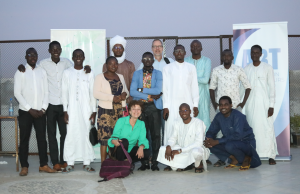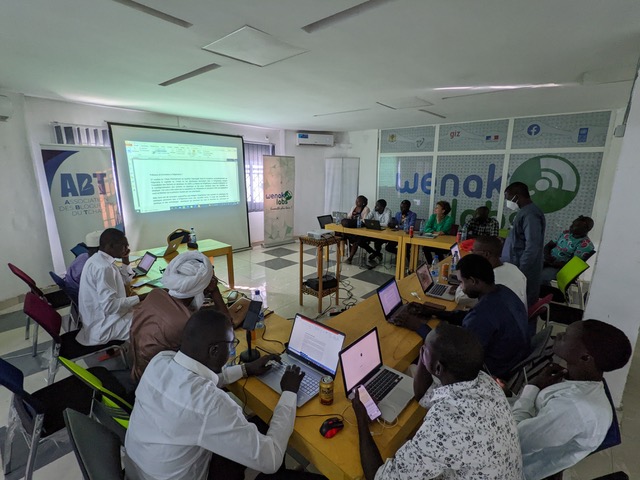Authors: Deuh’b Zyzou with contributions from Mirjam de Bruijn and Laurens Nijzink
The Bloggers Association Chad and the Voice4Thought Foundation (Netherlands) have initiated a project called “Tchadoblog: Raconter le Tchad autrement – Créer le “bon buzz” (Tchadoblog: Telling the story of Chad differently – Creating the right buzz) aimed at promoting blogging in a way that does not feed the rising polarisation in the country of Toumaï.
Although the participants were still shaken by a popular revolt and a violent military retaliation on Thursday October 20th, we nevertheless started the blogging workshop on the following Monday afternoon, October 24 2022, in the premises of the innovative incubator Wenaklabs located in the centre of N’Djamena. Voice4Thought was represented by its director Mirjam de Bruijn and journalist/editor Laurens Nijzink. The participants were given the opportunity to reflect openly on their role as bloggers in a socially, politically and culturally seriously polarised environment. We discussed the motivation of young people to become bloggers. Those who have already started blogging also shared their experiences. The bloggers were eager to contribute to changing the narrative around Chad and the way social media plays a role in this narrative. It is time to depolarise the discussions!
The core of Voice4Thought’s training is the research methodology. The first day of the blogging workshop was built around learning how to do research, in particular qualitative research. This skill allows students to grasp the basic notion of the work of a journalist.
Through discussions we arrived at a common understanding of the media ecology in Chad: on the one hand it consists of national newspapers, TV and radio that are dominated by reporting on what the government does and from a biased government perspective. On the other hand, private media provides other kinds of information, but almost always lacking critical discussion and debate. Social media have taken on this function, apart from their role of providing information. For Chadians, social media have become their main information space, and they take almost all information as viable.
The discussion on the media ecology of Chad led via the validity of information in the public sphere to a definition of the problem of fake news, disinformation and misinformation.

During the workshop participants were also introduced to new methods for structuring research and producing non-polarising stories. Learning by doing was the pedagogical principle during the five days. The participants discussed a lot with each other and went out on the street twice to do reporting and research. In order to tell depolarising stories, you have to listen first. Understanding the other person is the basis for going beyond one’s own references and even prejudices. This was practiced with the interview technique called ‘looping’: listen carefully and check whether you have understood the answer to your question. By looping you are also able to dig a little deeper during an interview.
Another aspect in making stories that do not polarize, is looking for complexity. If you zoom in, many things appear more complex than at first sight. You will see that people and events do not fit into simple dichotomies such as ‘good – bad’, ‘north – south’, ‘Arabic – French’, ‘Christian – Muslim’, to name a few. Depolarising stories amplify these exceptions.
During the last three days, participants worked on a story using the new learned techniques, and presented their outcomes on the last day. The presentations nicely showed how each person integrated the new way of working into their article in their own way.
Overall, the workshop was a promising start for the newly created bloggers’ association and for a long-term cooperation between Chadian bloggers and Voice4Thought.
In the coming months, the bloggers will receive remote, online support to produce compelling stories that depolarise. Because there is a great need for that in these difficult times.


